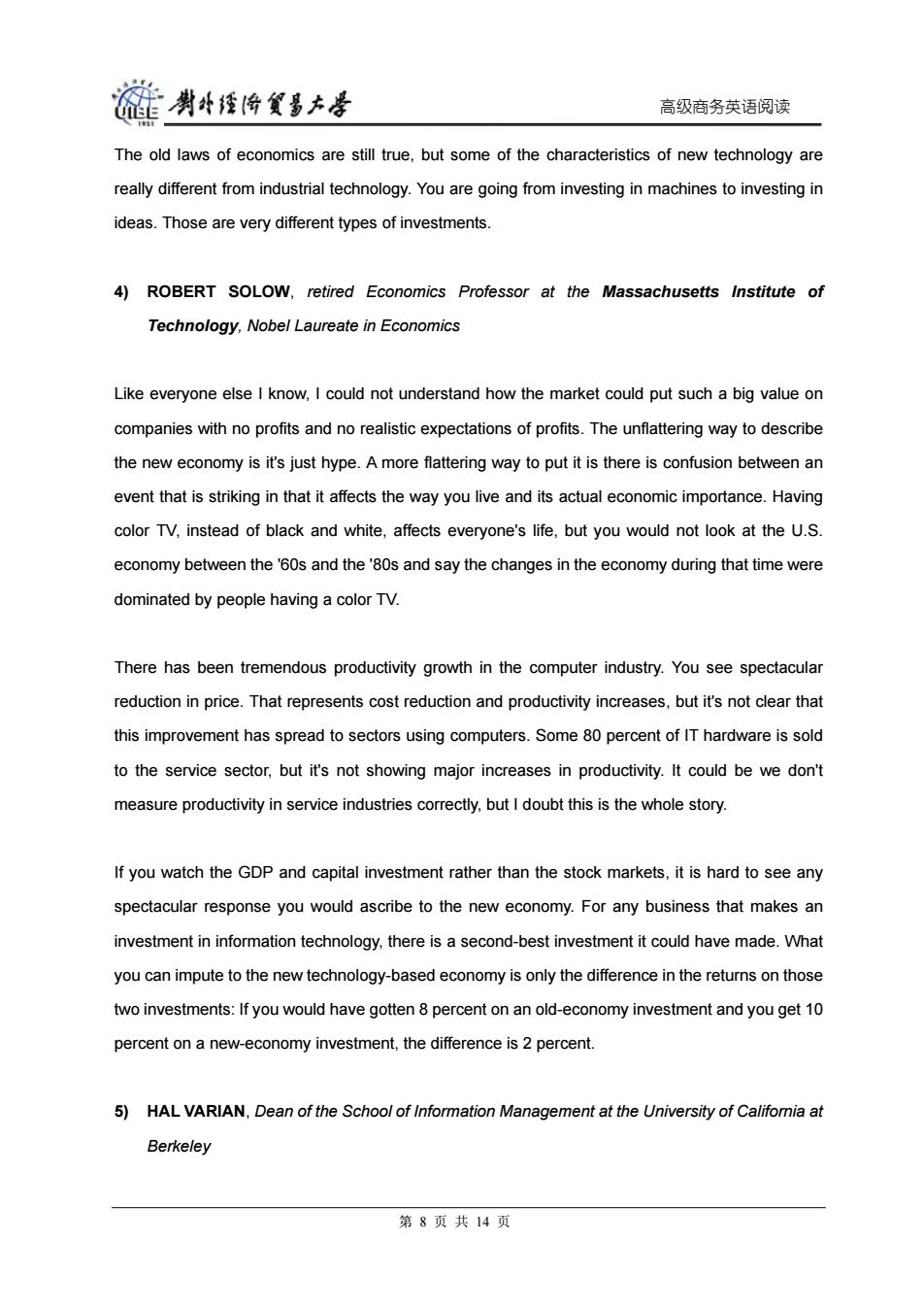正在加载图片...

链潮4将发多产号 高级商务英语阅读 The old laws of economics are still true,but some of the characteristics of new technology are really different from industrial technology.You are going from investing in machines to investing in ideas.Those are very different types of investments. 4)ROBERT SOLOW,retired Economics Professor at the Massachusetts Institute of Technology,Nobel Laureate in Economics Like everyone else I know,I could not understand how the market could put such a big value on companies with no profits and no realistic expectations of profits.The unflattering way to describe the new economy is it's just hype.A more flattering way to put it is there is confusion between an event that is striking in that it affects the way you live and its actual economic importance.Having color TV,instead of black and white,affects everyone's life,but you would not look at the U.S. economy between the '60s and the'80s and say the changes in the economy during that time were dominated by people having a color TV. There has been tremendous productivity growth in the computer industry.You see spectacular reduction in price.That represents cost reduction and productivity increases,but it's not clear that this improvement has spread to sectors using computers.Some 80 percent of IT hardware is sold to the service sector,but it's not showing major increases in productivity.It could be we don't measure productivity in service industries correctly,but I doubt this is the whole story. If you watch the GDP and capital investment rather than the stock markets,it is hard to see any spectacular response you would ascribe to the new economy.For any business that makes an investment in information technology,there is a second-best investment it could have made.What you can impute to the new technology-based economy is only the difference in the returns on those two investments:If you would have gotten 8 percent on an old-economy investment and you get 10 percent on a new-economy investment,the difference is 2 percent. 5)HAL VARIAN,Dean of the School of Information Management at the University of Califomia at Berkeley 第8页共14页高级商务英语阅读 The old laws of economics are still true, but some of the characteristics of new technology are really different from industrial technology. You are going from investing in machines to investing in ideas. Those are very different types of investments. 4) ROBERT SOLOW, retired Economics Professor at the Massachusetts Institute of Technology, Nobel Laureate in Economics Like everyone else I know, I could not understand how the market could put such a big value on companies with no profits and no realistic expectations of profits. The unflattering way to describe the new economy is it's just hype. A more flattering way to put it is there is confusion between an event that is striking in that it affects the way you live and its actual economic importance. Having color TV, instead of black and white, affects everyone's life, but you would not look at the U.S. economy between the '60s and the '80s and say the changes in the economy during that time were dominated by people having a color TV. There has been tremendous productivity growth in the computer industry. You see spectacular reduction in price. That represents cost reduction and productivity increases, but it's not clear that this improvement has spread to sectors using computers. Some 80 percent of IT hardware is sold to the service sector, but it's not showing major increases in productivity. It could be we don't measure productivity in service industries correctly, but I doubt this is the whole story. If you watch the GDP and capital investment rather than the stock markets, it is hard to see any spectacular response you would ascribe to the new economy. For any business that makes an investment in information technology, there is a second-best investment it could have made. What you can impute to the new technology-based economy is only the difference in the returns on those two investments: If you would have gotten 8 percent on an old-economy investment and you get 10 percent on a new-economy investment, the difference is 2 percent. 5) HAL VARIAN, Dean of the School of Information Management at the University of California at Berkeley 第 8 页 共 14 页